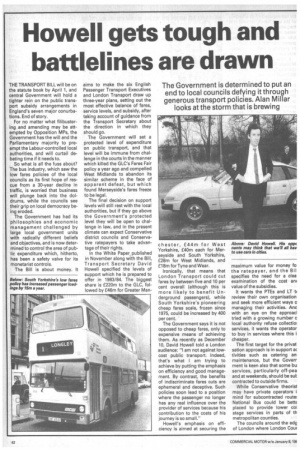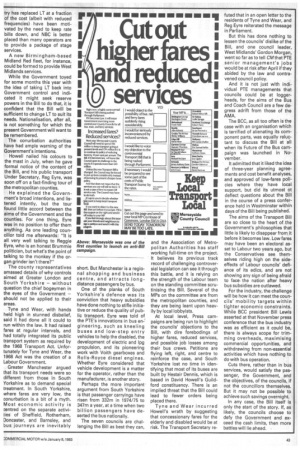Howell gets tough and baftlelines are drawn
Page 44

Page 45

If you've noticed an error in this article please click here to report it so we can fix it.
The Government is determined to put an end to local councils defying it through generous transport policies. Alan Millar looks at the storm that is brewing
THE TRANSPORT BILL will be on the statute book by April 1, and central Government will hold a tighter rein on the public transport subsidy arrangements in England's seven major conurbations. End of story.
For no matter what filibustering and amending may be attempted by Opposition MPs, the Government has the will and the Parliamentary majority to preempt the Labour-controlled local authorities, and will curtail debating time if it needs to.
So what is all the fuss about? The bus industry, which saw the low fares policies of the local councils as its first hope of rescue from a 30-year decline in traffic, is worried that business will plunge back into the doldrums, while the councils see their grip on local democracy being eroded.
The Government has had its philosophies and economic management challenged by large local government units with radically different beliefs and objectives, and is now determined to control the area of public expenditure which, hitherto, has been a safety valve for its monetarist controls.
The Bill is about money. It aims to make the six English Passenger Transport Executives and London Transport draw up three-year plans, setting out the most effective balance of fares, service levels, and subsidy, after taking account of guidance from the Transport Secretary about the direction in which they should go.
The Government will set a protected level of expenditure on public transport, and that level will be immune from challenge in the courts in the manner which killed the GLC's Fares Fair policy a year ago and compelled West Midlands to abandon its similar scheme in the face of apparent defeat, but which found Merseyside's fares freeze to be legal.
The final decision on support levels will still rest with the local authorities, but if they go above the Government's protected level they will be open to challenge in law, and in the present climate can expect Conservative district councils and Conservative ratepayers to take advantage of their rights.
In the White Paper published in November along with the Bill, Transport Secretary David Howell specified the levels of support which he is prepared to offer in 1983/84. The biggest share is E220m to the GLC, followed by £46m for Greater Man chester, £44m for West Yorkshire, £40m each for Merseyside and South Yorkshire, £28m for West Midlands, and E18m for Tyne and Wear.
Ironically, that means that London Transport could cut fares by between five and 10 per cent overall (although this is more likely to benefit Underground passengers), while South Yorkshire's pioneering cheap fares scale, frozen since 1975, could be increased by 400 per cent.
The Government says it is not opposed to cheap fares, only to expensive means of achieving them. As recently as December 10, David Howell told a London audience: "I am not against lowcost public transport. Indeed, that's what I am trying to achieve by putting the emphasis on efficiency and good management. By contrast, the benefits of indiscriminate fares cuts are ephemeral and deceptive. Such policies soon lead to a position where the passenger no longer has any real influence over the provider of services because his contribution to the costs of his journey is so small."
Howell's emphasis on efficiency is aimed at securing the maximum value for money fo the ratepayer, and the Bil specifies the need for a clea examination of the cost an value of the subsidies.
It wants the PTEs and LT t4 review their own organisation and seek more efficient ways managing their activities. Anc with an eye on the approacl tried with a growing number c local authority refuse collectioi services, it wants the operator to buy in services where this i cheaper.
The first target for the privet sation approach is in support a( tivities such as catering an maintenance, but the Goverr ment is keen also that some bu services, particularly off-pea and at weekends, should be sul contracted to outside firms.
While Conservative theorist may have private operators i mind for subcontracted route; National Bus could be bettE placed to provide lower co: stage services in parts of th metropolitan counties.
The councils around the edc of London where London Cow try has replaced LT at a fraction of the cost (albeit with reduced frequencies) have been motivated by the need to keep rate bills down, and NBC is better placed than many operators are to provide a package of stage services.
A new Birmingham-based Midland Red fleet, for instance, could be formed to provide West Midlands services.
While the Government toyed for some months this year with the idea of taking LT back into Government control and indicated it might seek reserve powers in the Bill to do that, it is confident that the Bill will be sufficient to change LT to suit its needs. Nationalisation, after all, is not something for which the present Government will want to be remembered.
The conurbation authorities have had ample warning of the Government's intentions.
Howell nailed his colours to the mast in July, when he gave formal notice of the content of the Bill, and his public transport Under Secretary, Reg Eyre, was soon off on a fact-finding tour of the metropolitan counties.
He explained the Government's broad intentions, and listened intently, but the tour found little accord between the aims of the Government and the counties. For one thing, Eyre was in no position to offer them anything. As one leading councillor told me afterwards: "It is all very well talking to Reggie Eyre, who is an honest Brummie politician, but what's the point of talking to the monkey if the organ grinder isn't there?"
The county representatives amassed details of why controls aimed at Greater London and South Yorkshire — without question the chief bogeymen in the eyes of the Government — should not be applied to their areas.
Tyne and Wear, with hands held high in stunned disbelief, said it had done all it could to run within the law. It had raised fares at regular intervals, and had totally integrated its public transport system as required by the 1968 Transport Act. Unfortunately for Tyne and Wear, the 1968 Act was the creation of a Labour Government.
Greater Manchester argued that its transport needs were so different from those in South Yorkshire as to demand special treatment. In South Yorkshire, where fares are very low, the conurbation is a bit of a myth. Most economic activity is :.•entred on the separate activities of Sheffield, Rotherham, Doncaster, and Barnsley, and bus journeys are inevitably short. But Manchester is a regional shopping and business centre, and attracts longdistance passengers by bus.
One of the planks of South Yorkshire's defence was its conviction that heavy subsidies have done nothing to stifle initiative or reduce the quality of public transport. Eyre was told of the PTE's innovations in bus en-' gineering, such as kneeling buses and low-step entry vehicles to help the disabled, the development of electric and lpg propulsion, and its pioneering work with Voith gearboxes and Rolls-Royce diesel engines. Whether Eyre considered that vehicle development is a matter for the operator, rather than the manufacturer, is another story.
Perhaps the more important argument from South Yorkshire is that passenger carryings have risen from 332m in 1974/75 to 347m a year, at a time when two billion passengers have deserted the bus nationally.
The seven councils are challenging the Bill as best they can, and the Association of Metropolitan Authorities has staff working full-time on the project. It believes its previous track record of challenging controversial legislation can see it through this battle, and it is relying on the strength of the Labour team on the standing committee scrutinising the Bill. Several of the MPs on the committee are from the metropolitan counties, and they are being leant upon heavily by local lobbyists.
At local level, Press campaigns are being run to highlight the councils' objections to the Bill, with dire forebodings of higher fares, reduced services, and possible job losses among their bus crews. Petitions are flying left, right, and centre to reinforce the case, and South Yorkshire lost no time in identifying that most of its buses are built by Hestair Dennis, which is based in David Howell's Guildford constituency. There is an implied threat that the Bill could lead to fewer orders being placed there.
Tyne and Wear incurred Howell's wrath by suggesting that concessionary fares for the elderly and disabled would be at risk. The Transport Secretary re futed that in an open letter to the residents of Tyne and Wear, and Reg Eyre reiterated the message in Parliament.
But this has done nothing to lessen the councils' dislike of the Bill, and one council leader, West Midlands' Gordon Morgan, went so far as to tell CM that PTE senior management's jobs would be at risk after April if they abided by the law and contravened council policy.
And it is not just with individual PTE managements that councils could be at loggerheads, for the aims of the Bus and Coach Council are a few degress adrift from those of the AMA.
The BCC, as all too often is the case with an organisation which is terrified of alienating its component parts, was equally reluctant to discuss the Bill at all when its Future of the Bus campaign was launched in November.
It admitted that it liked the idea of three-year planning agreements and cost benefit analyses, and approved of low-fares policies where they have local support, but did its utmost ot deflect questions about the Bill in the course of a press conference held in Westminster within days of the Bill being published.
The aims of the Transport Bill are so close to the heart of the Government's philosophies that little is likely to disappear from it before it becomes law. Low fares may have been an electoral asset to Labour two years ago, but the Conservatives see themselves riding high on the sideeffects of Labour councils' defiance of its edics, and are not showing any sign of being afraid to face the nation after heavy bus subsidies are outlawed.
For the industry, the challenge will be how it can meet the councils' mobility targets within tighter economic constraints. While BCC president Bill Lewis asserted at that November press conference that the bus industry was as efficient as it could be, there is always scope for trimming overheads, maximising commercial opportunities, and withdrawing from non-essential activities which have nothing to do with bus operation.
Cuts there, rather than in bus services, would satisfy the passenger, the Government, and the objectives, of the councils, if not the councillors themselves. But it may not be possible to achieve such savings overnight.
In any case, the Bill itself is only the start of the story. If, as likely, the councils choose to defy the Government and exceed the cash limits, then more battles will lie ahead.








































































